
The dominant influence on Earth’s climate and environment is human activity fuelled by the world energy system. This has been identified as a new geological age named the Anthropocene, which amounts to a biosphere emergency1 2 3 4.
This news feed lists articles about the Anthropocene, with particularly worrying content below. Tags are shown at the bottom of each article, and in the site’s footer.
You can also subscribe to this feed using this RSS link.
-
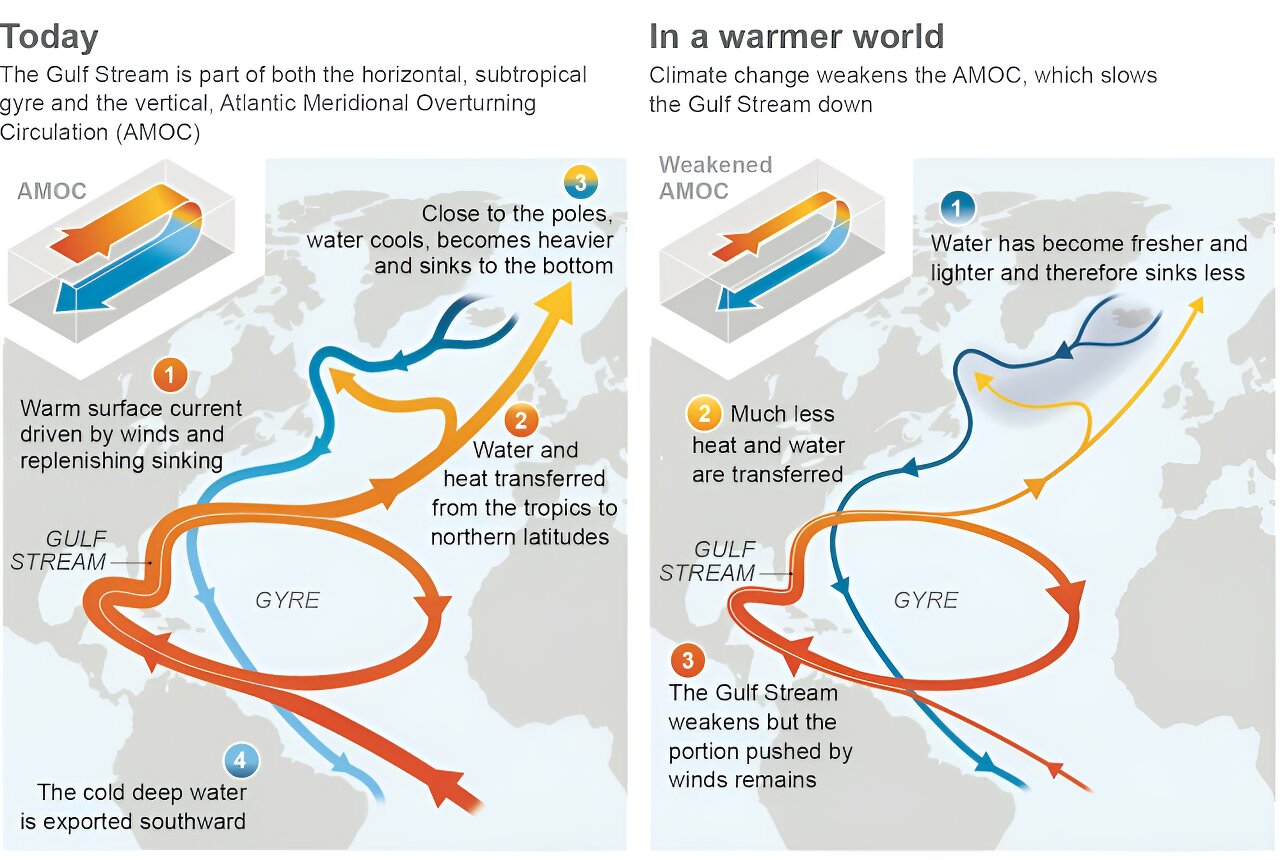
Once melting glaciers shut down the Gulf Stream, we will see extreme climate change within decades
Ocean currents are driven by winds, tides and water density differences. In the Atlantic Ocean circulation, the relatively warm and salty surface water near the equator flows toward Greenland. During…
-
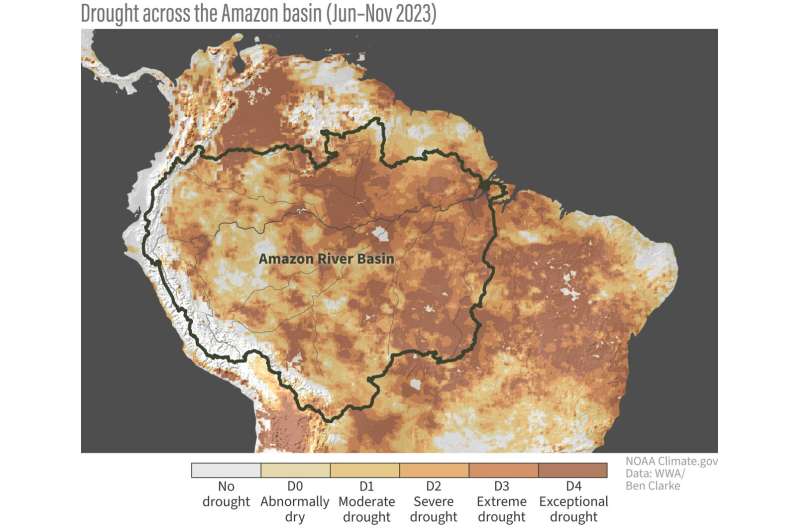
What’s causing the Amazon’s ongoing record drought?
The devastating drought in the Amazon River Basin that reported in October has continued into Northern Hemisphere winter, which is the heart of the wet season in the southern part…
-
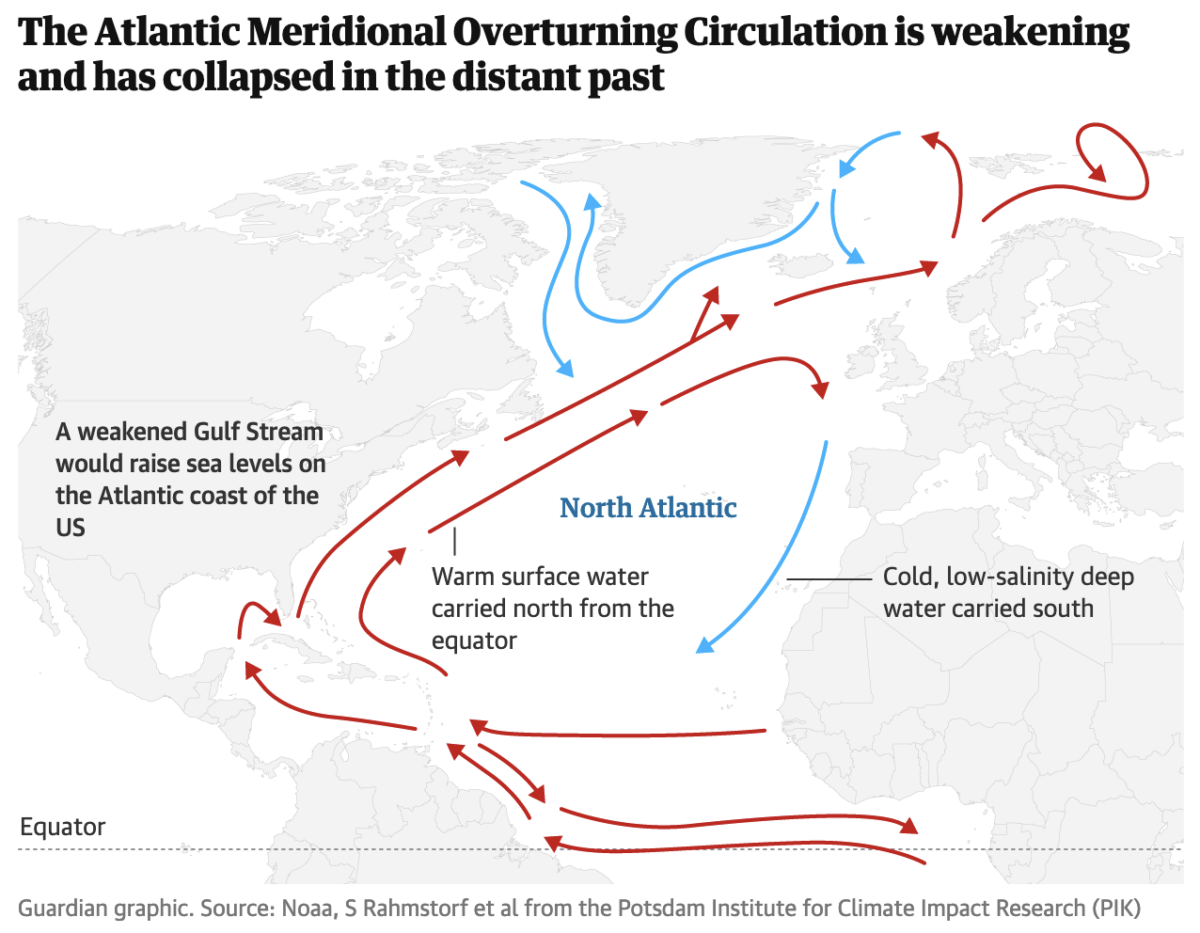
Atlantic Ocean circulation nearing ‘devastating’ tipping point
AMOC, which encompasses part of the Gulf Stream and other powerful currents, is a marine conveyer belt that carries heat, carbon and nutrients from the tropics towards the Arctic Circle,…
-

Marine sponges reveal global warming has already exceeded 1.5 degrees
Scientists analysed 300 years of ocean temperature records from marine sponges and discovered global warming has increased by 0.5˚C more than was previously estimated. In the study, published in Nature…
-
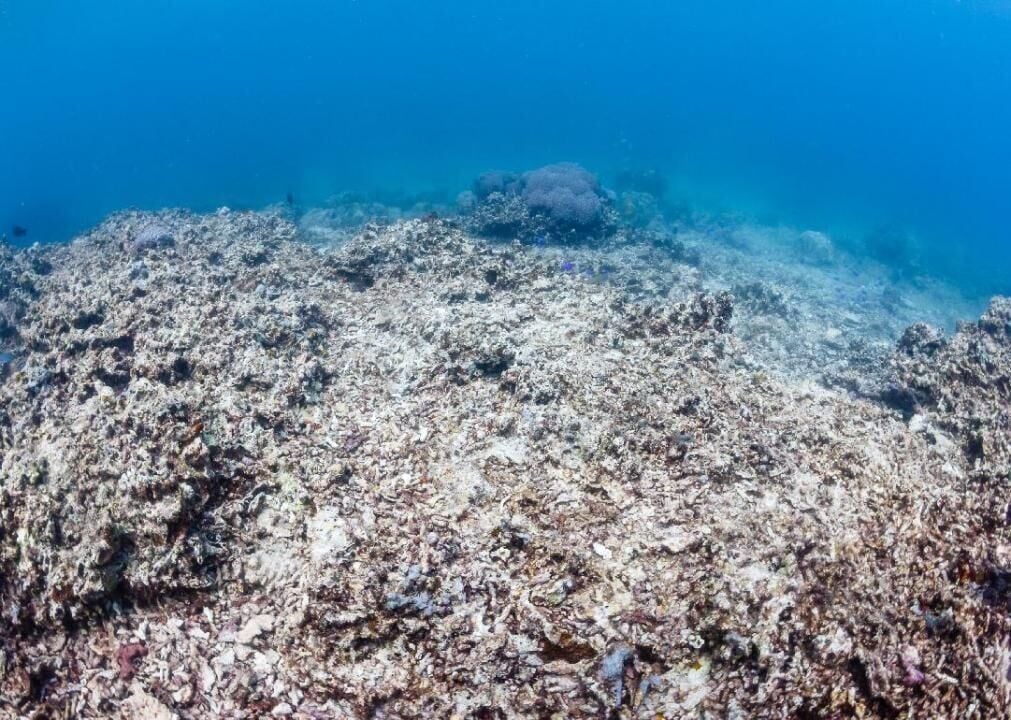
Assessment of warm-water coral reef tipping point thresholds
Warm-water coral reefs are facing unprecedented Anthropogenic driven threats to their continued existence as biodiverse, functional ecosystems upon which hundreds of millions of people rely. We draw upon a literature…
-

Ice sheet collapse closer than thought
How the West Antarctic Ice Sheet (WAIS) responded to warmer climates in the geologic past has obvious relevance to our understanding of what its future could be as global temperatures…
-

Flowers ‘giving up’ on scarce insects and evolving to self-pollinate
Flowers are “giving up on” pollinators and evolving to be less attractive to them as insect numbers decline. A study has found the flowers of field pansies growing near Paris…
-

Dubai summit adopts world-first ‘transition’ from fossil fuels
Nearly 200 nations meeting in Dubai on Wednesday approved a first-ever call for the world to transition away from fossil fuels. The biggest-ever COP meeting hosted more than 88,000 people,…
-

Endangered species list grows by 2,000. Climate change is part of the problem.
Leaders of the IUCN updated their Red List of Threatened Species, a tracker of biodiversity around the globe. It was mainly bad news. The list includes information on 157,000 species,…
-
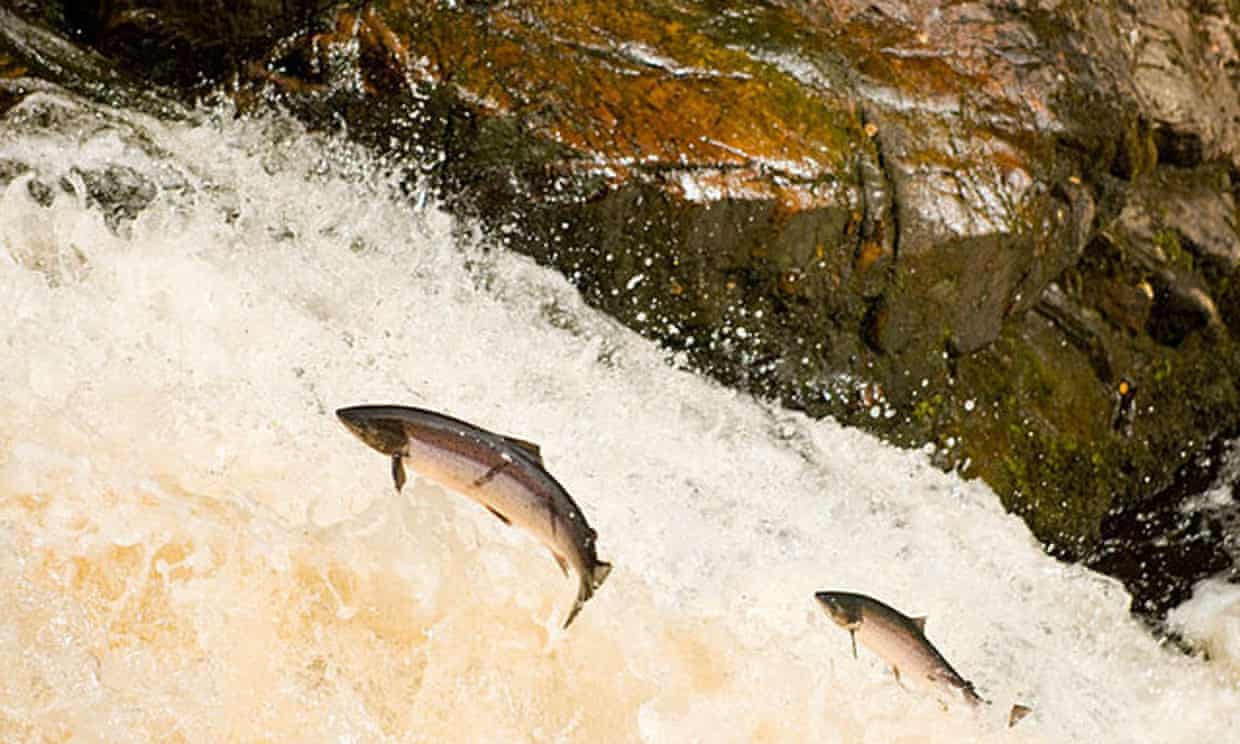
Quarter of world’s freshwater fish at risk of extinction
Nearly a quarter of the world’s freshwater fish are at risk of extinction due to global heating, overfishing and pollution, according to an expert assessment. Nearly a fifth of all…
-
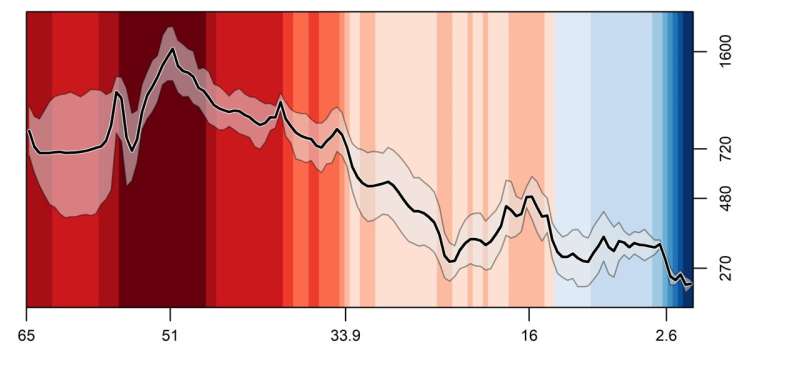
Current carbon dioxide levels last seen 14 million years ago
New analysis finds the last time the air contained 420 parts per million (ppm) of carbon dioxide was between 14-16 million years ago, when there was no ice in Greenland…
-
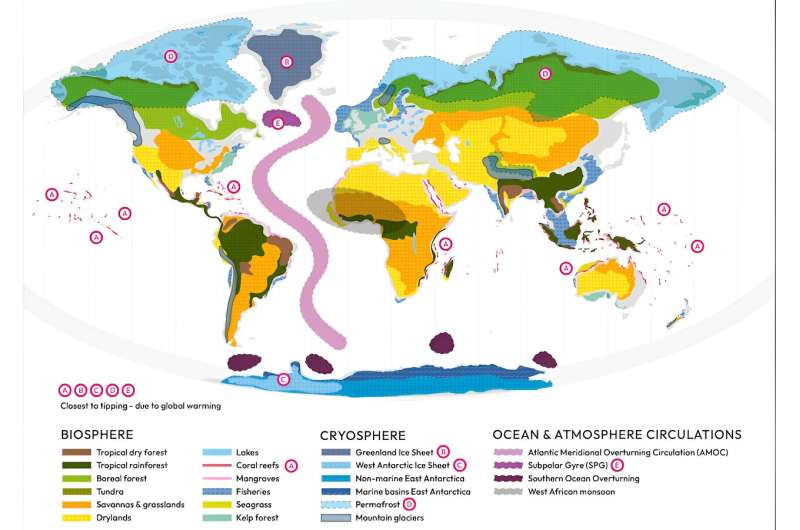
Climate tipping points are nearer than you think. Our new report warns of catastrophic risk.
Most people expect that if a system, like someone’s body, an ecosystem, or part of the climate system, becomes stressed, it’ll respond fairly predictably—double the pressure, double the impact, and…
-
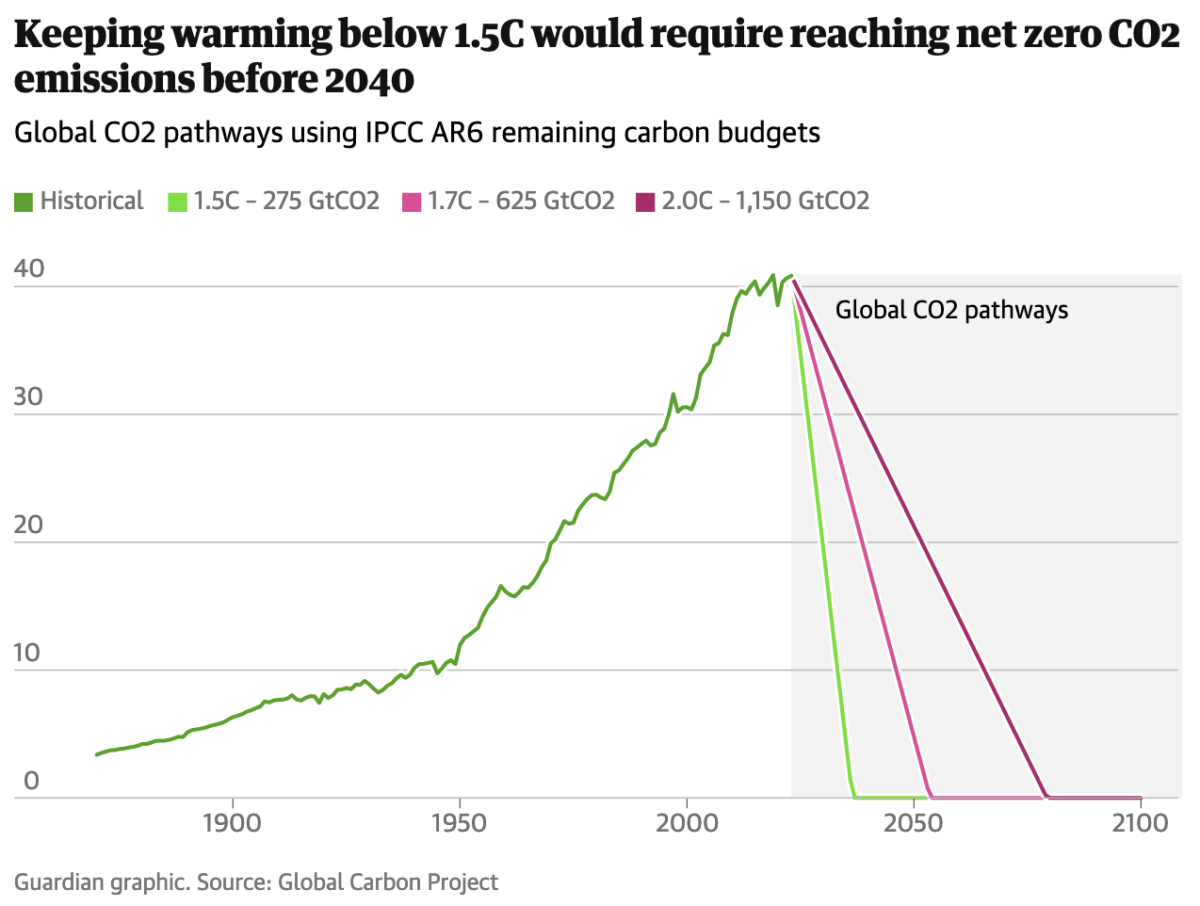
Global carbon emissions from fossil fuels to hit record high
The world is on track to have burned more coal, oil and gas in 2023 than it did in 2022, according to a report by the Global Carbon Project, pumping…
-

COP28 president says there is ‘no science’ behind demands for phase-out of fossil fuels
The president of COP28, Sultan Al Jaber, has claimed there is “no science” indicating that a phase-out of fossil fuels is needed to restrict global heating to 1.5˚C, the Guardian…
-

Emissions Gap Report 2023
Total global greenhouse gas (GHG) emissions in 2020 were 54.5GtCO2e, and grew to 57.4 in 2022. The emissions gap for 2030 is defined as the differencebetween the estimated total global…
-
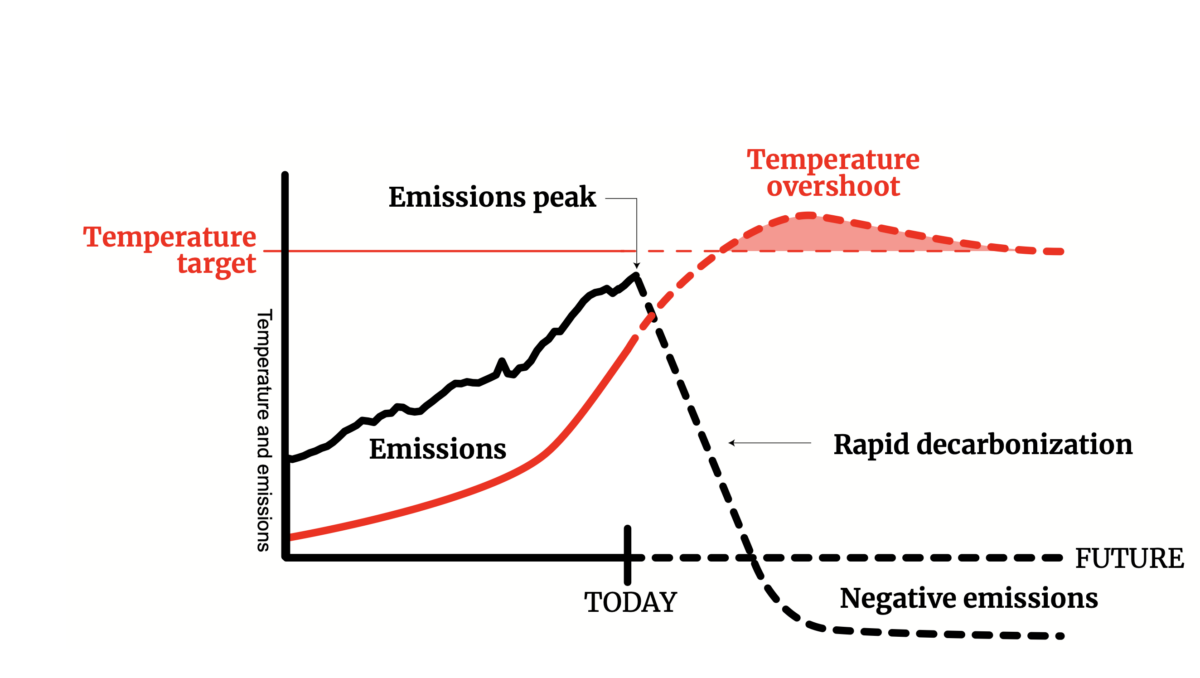
Remaining Carbon Budget
The remainin budget for a reliable chance (83%) of not exceeding 1.5˚C global warming has been expended – After making all these changes, our best (50%) RCB estimate starting from…
-

When Idiot Savants Do Climate Economics
The Intergovernmental Panel on Climate Change has assumed Nordhaus is to be trusted. The integrated assessment models used at the IPCC are based on Nordhausian visions of adaptation to warming…
-
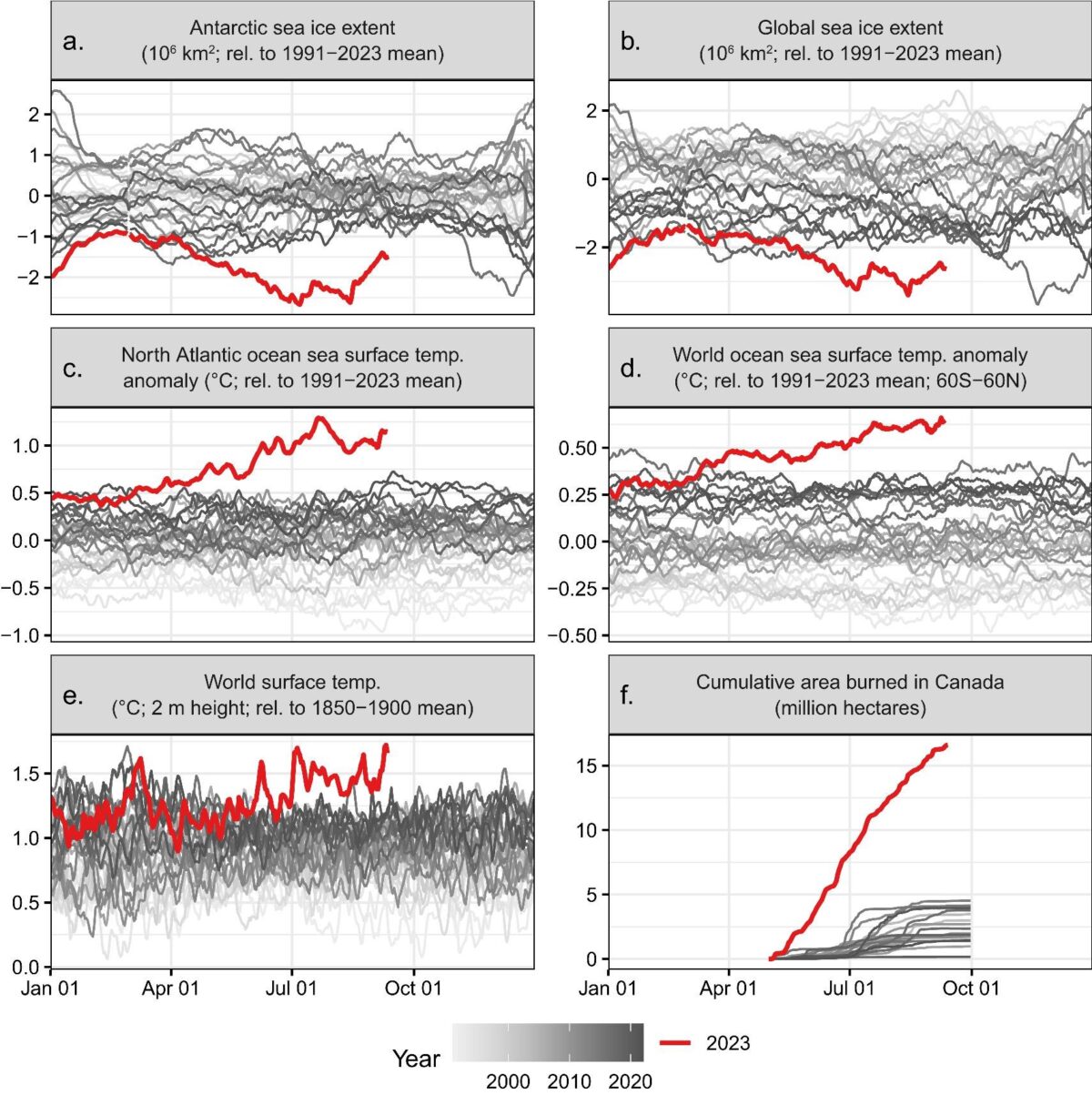
Climate report: ‘Uncharted territory’ imperils life on Earth
Earth’s vital signs have worsened beyond anything humans have yet seen, to the point that life on the planet is imperiled. William Ripple, a distinguished professor in the Oregon State…
-
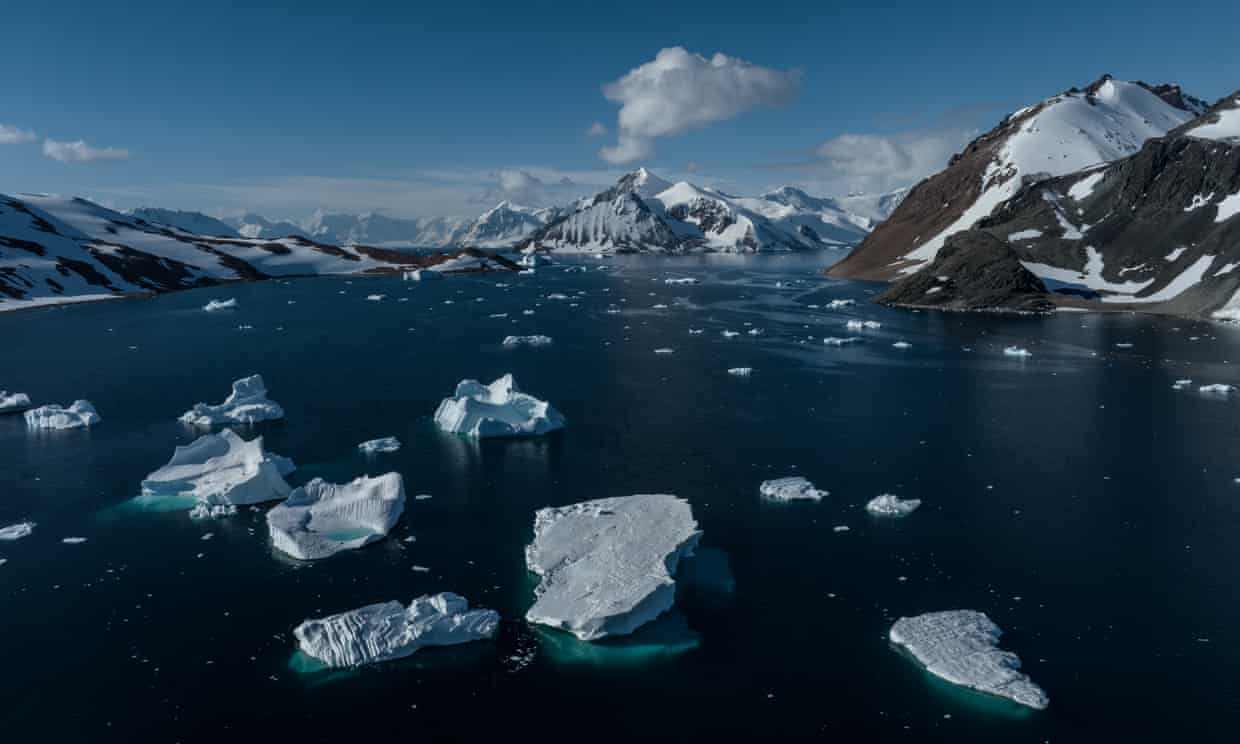
Rapid ice melt in west Antarctica now inevitable
Accelerated ice melt in west Antarctica is inevitable for the rest of the century no matter how much carbon emissions are cut, research indicates. The implications for sea level rise…
-
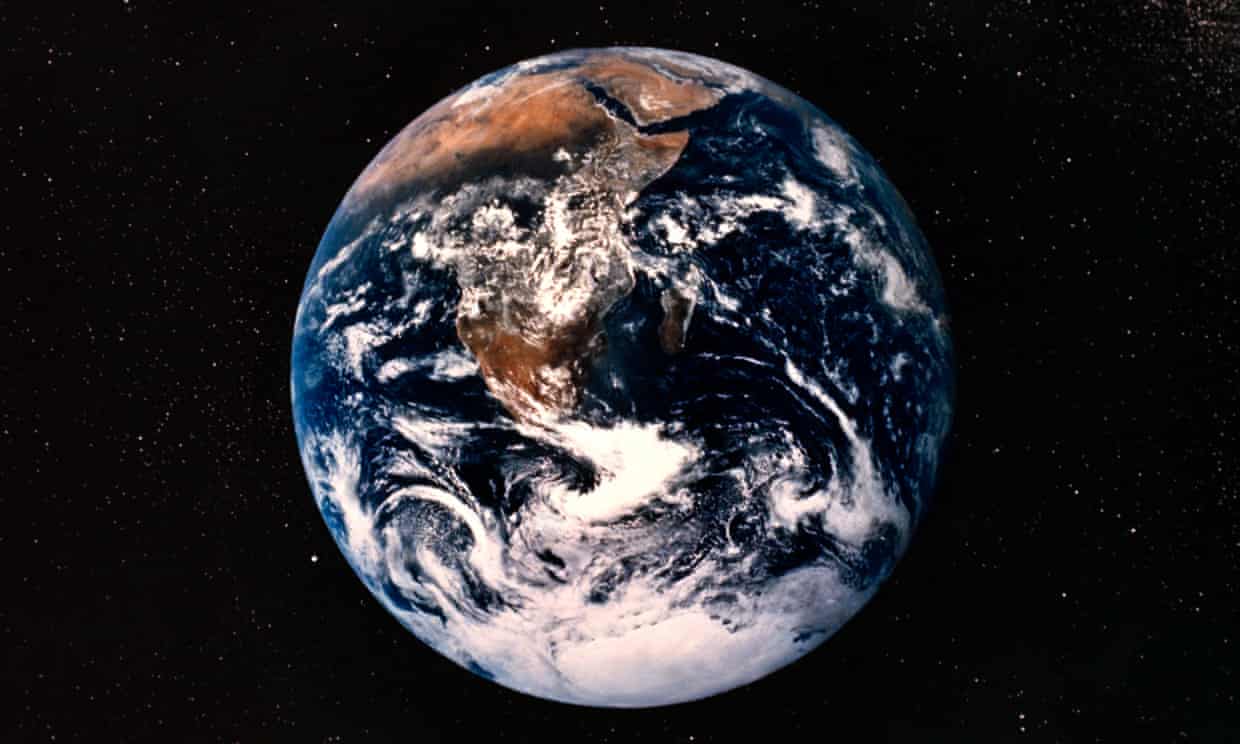
Earth ‘well outside safe operating space for humanity’
Earth’s life support systems have been so damaged that the planet is “well outside the safe operating space for humanity”, scientists have warned. Their assessment found that six out of…
-
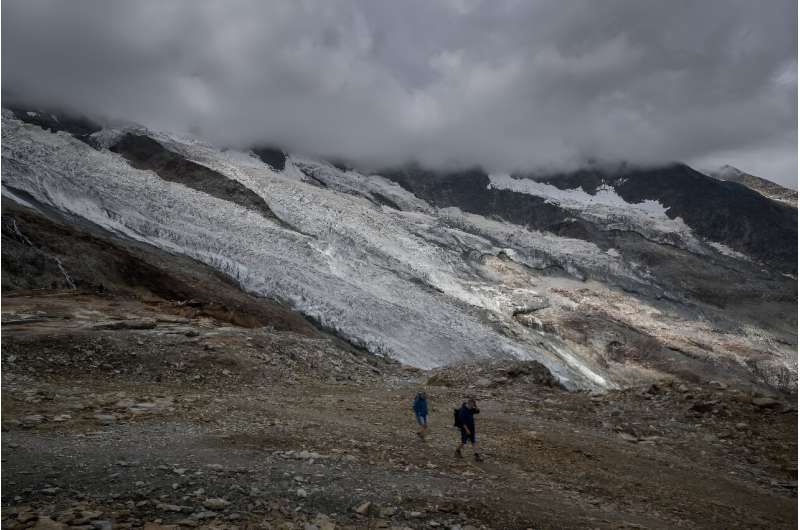
Pace of increase in CO₂ concentration has increased three-fold
The pace at which the concentration of CO2 in the atmosphere has jumped three-fold in five decades. Annual growth in global mean carbon dioxide averaged across the last decade has…
-
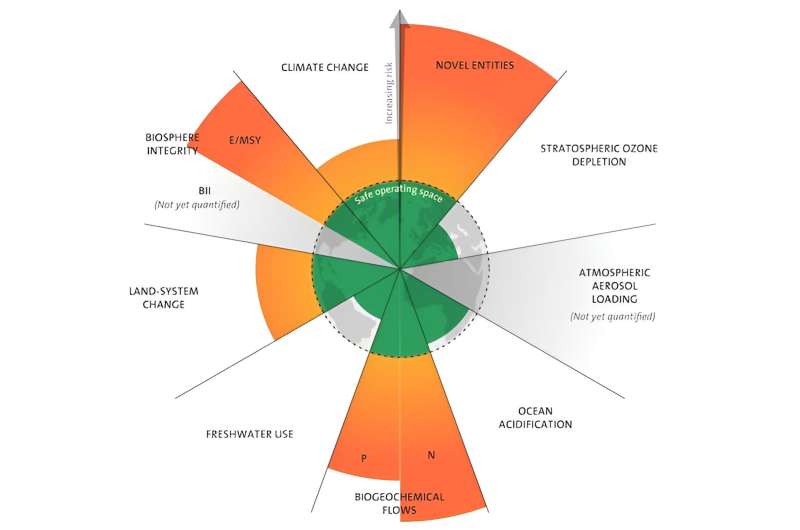
Critics of ‘degrowth’ economics say it’s unworkable—but from an ecologist’s perspective, it’s inevitable
You may not have noticed, but earlier this month we passed Earth overshoot day, when humanity’s demands for ecological resources and services exceeded what our planet can regenerate annually. Many…
-

Signs of the human era, from nuclear fallout to microplastics
Soaring greenhouse gases, ubiquitous microplastics, pervasive “forever chemicals”, the global upheaval of animals, even old mobile phones and chicken bones—all have been put forward as evidence that the world entered…
-
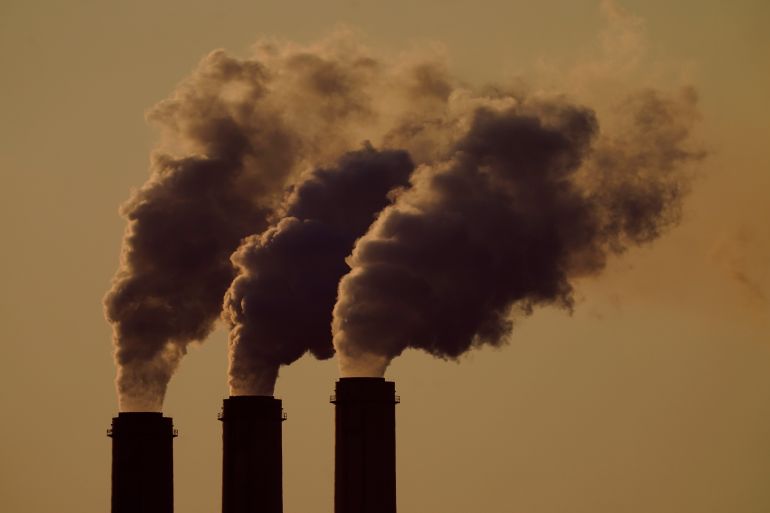
Evidence in Canada lake indicates start of new Anthropocene epoch
Scientists say human activity has so fundamentally altered the geology, atmosphere and biology of the earth that it has entered a new geologic epoch known as the Anthropocene. On Tuesday,…
-
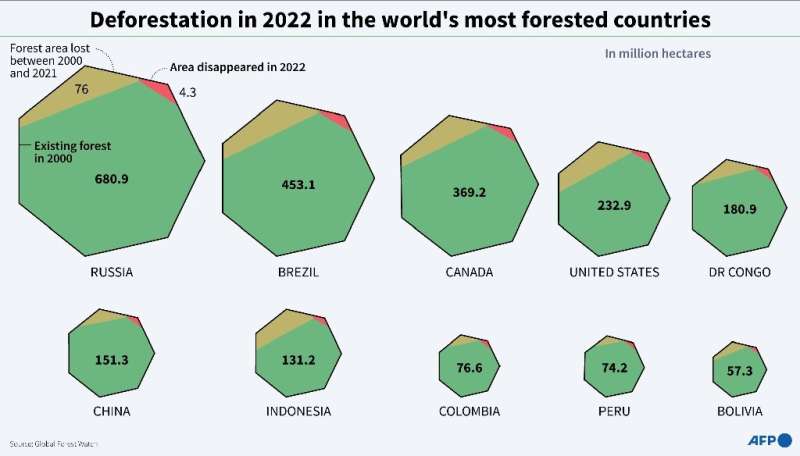
Football pitch of tropical forest lost every 5 seconds
Earth lost an area of carbon-absorbing rainforest larger than Switzerland or the Netherlands in 2022, most of it destroyed to make way for cattle and commodity crops. That is nearly…
-
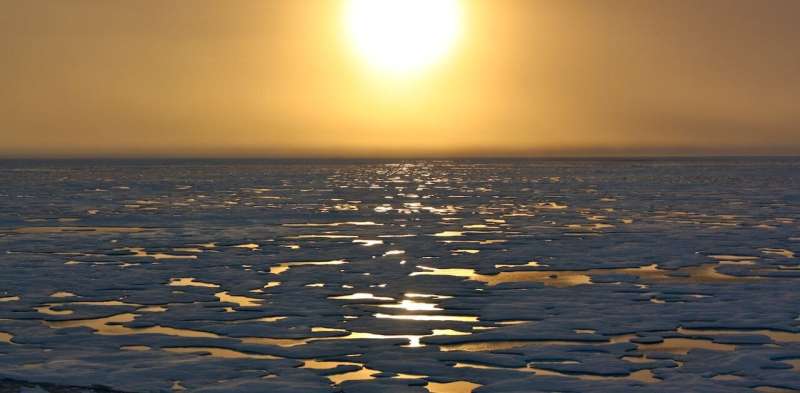
Arctic Ocean could be ice-free in summer by 2030s, with global, damaging and dangerous consequences
The Arctic Ocean could be ice-free in summer by the 2030s, even if we do a good job of reducing emissions between now and then. That’s the worrying conclusion of…
-

Will fossil fuel phase-out make it onto the UN’s climate agenda?
United Nations climate chief says while the rapid end of burning coal, oil, and natural gas is urgently needed, the topic may not even reach crucial COP28 negotiations.
-
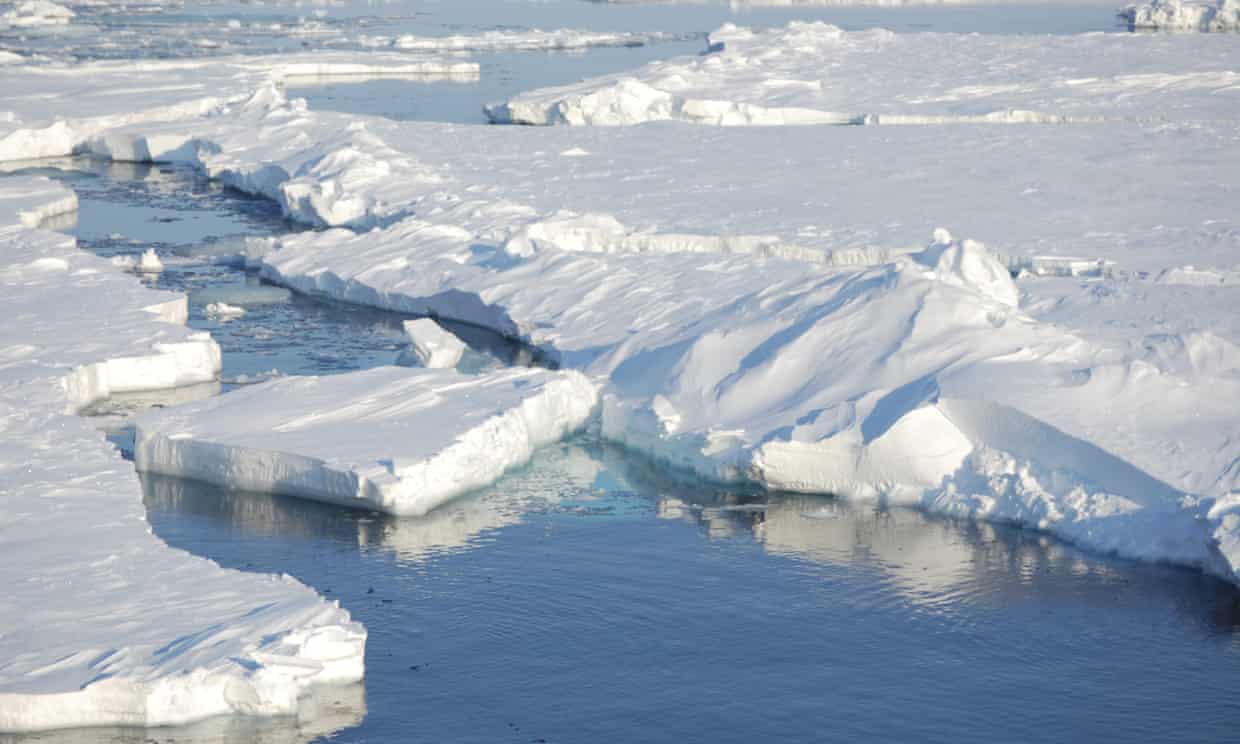
Too late now to save Arctic summer ice, climate scientists find
It is now too late to save summer Arctic sea ice. The study also shows that if emissions decline slowly or continue to rise, the first ice-free summer could be…
-
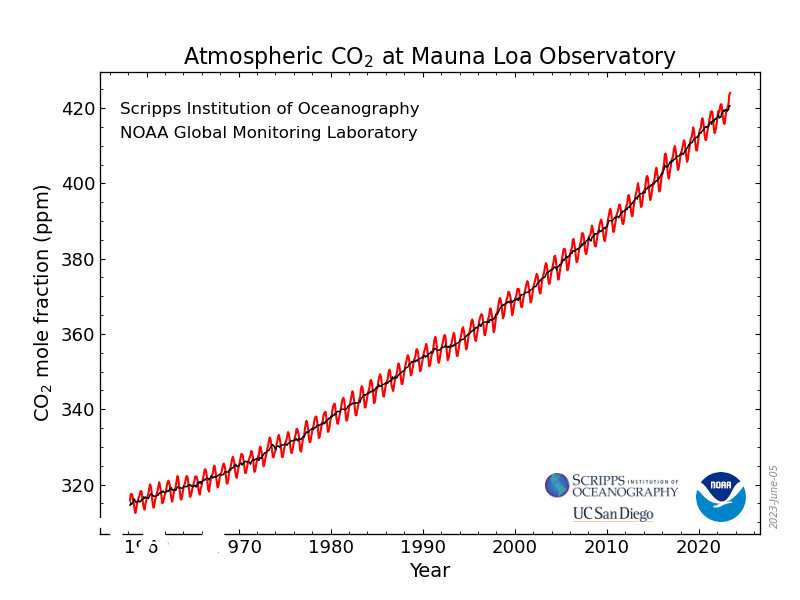
Amount of warming triggering carbon dioxide in air hits new peak, growing at near-record fast rate
“CO2 now is higher than any time in the last 4 to 4.5 million years when the atmosphere was about 7 degrees Fahrenheit (3.9 degrees Celsius) warmer and sea levels…
-
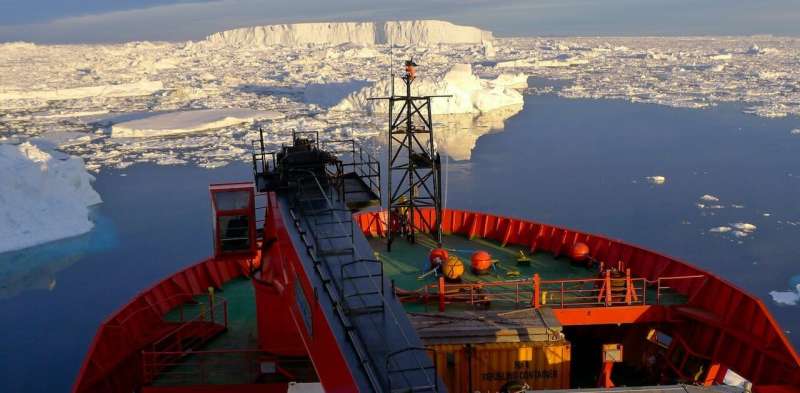
Antarctic alarm bells: Observations reveal deep ocean currents are slowing earlier than predicted
We found melting of Antarctic ice is disrupting the formation of Antarctic bottom water. The meltwater makes Antarctic surface waters fresher, less dense, and therefore less likely to sink. This…
-

Saving humanity: Here’s a radical approach to building a sustainable and just society
The dangerous and destructive myths of conventional economics include the claims that: Since planetary boundaries have already been exceeded and low-income countries must develop, social justice demands that the rich…
-
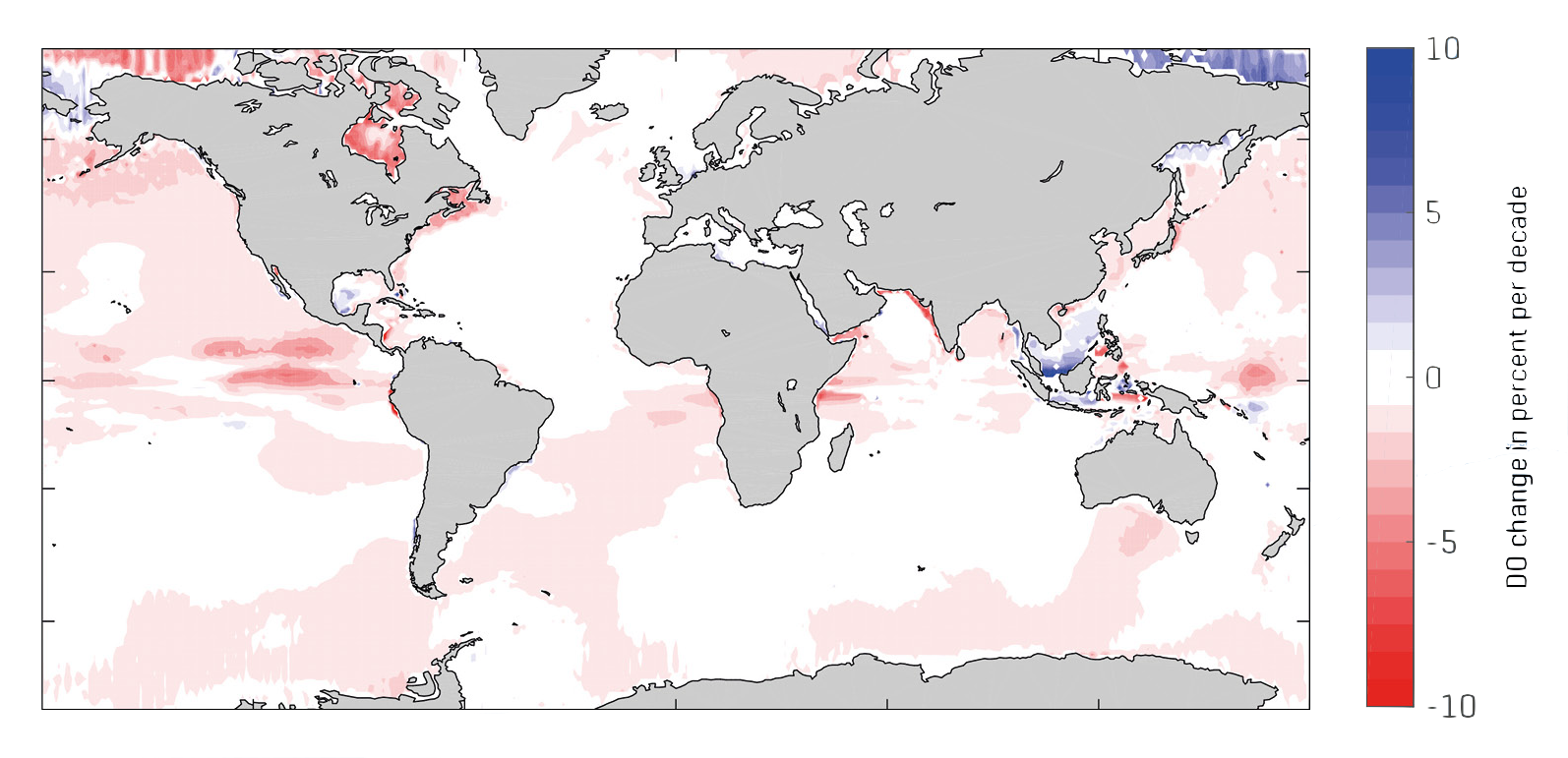
As Ocean Oxygen Levels Dip, Fish Face an Uncertain Future
Researchers complain that the oxygen problem doesn’t get the attention it deserves, with ocean acidification and warming grabbing the bulk of both news headlines and academic research. Just this April,…
-
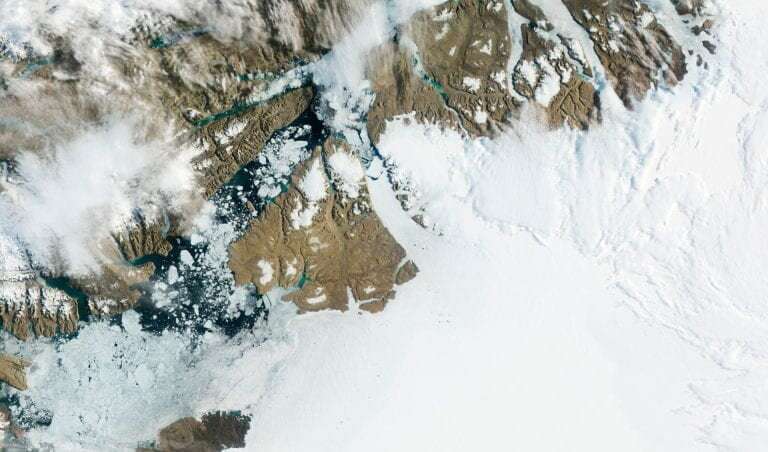
Researchers discover a cause of rapid ice melting in Greenland
“These ice-ocean interactions make the glaciers more sensitive to ocean warming,” said senior co-author Eric Rignot, UCI professor of Earth system science and NASA JPL research scientist. “These dynamics are…
-
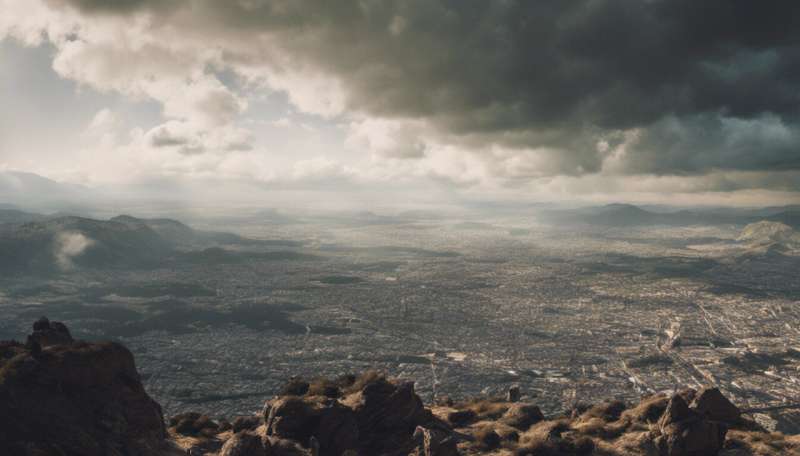
Humanity’s tipping point? How the Queen’s death stole a climate warning’s thunder
On September 8, 2022, at 6.30pm in Britain, Buckingham Palace announced the death of Queen Elizabeth II. The news broke just 30 minutes before the press embargo lifted on a…
-
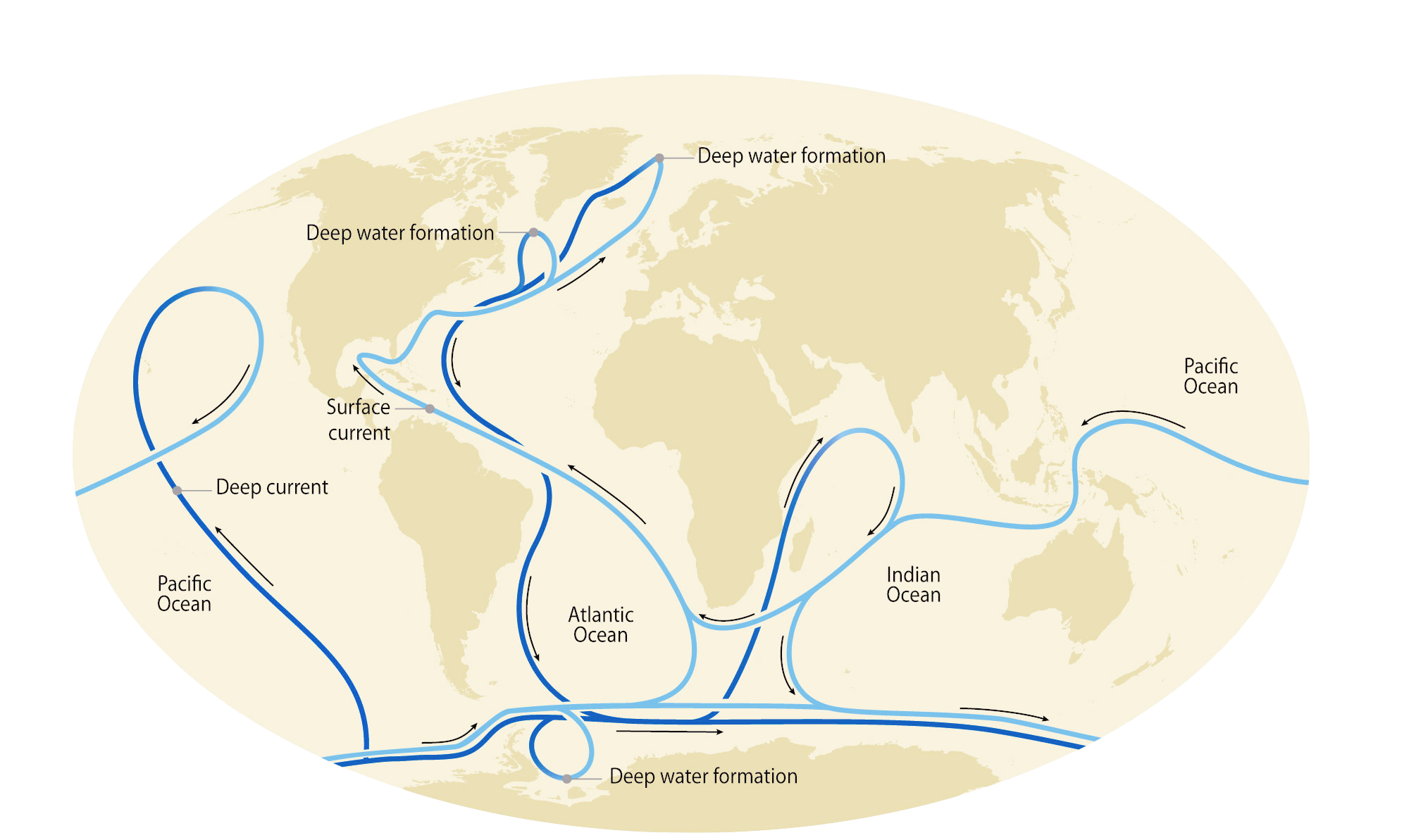
New Research Sparks Concerns That Ocean Circulation Will Collapse
The groundbreaking modeling study published by Australian and American researchers at the end of March for the first time includes a detailed assessment of the likely impact of melting ice,…
-

Look up, listen, and be very concerned. Birds are vanishing – and their crisis is our crisis
The UK has lost 40m birds since 1970 and Europe as a whole has lost 600m birds since 1980. The British figures, especially for farmland species such as skylark and…
-
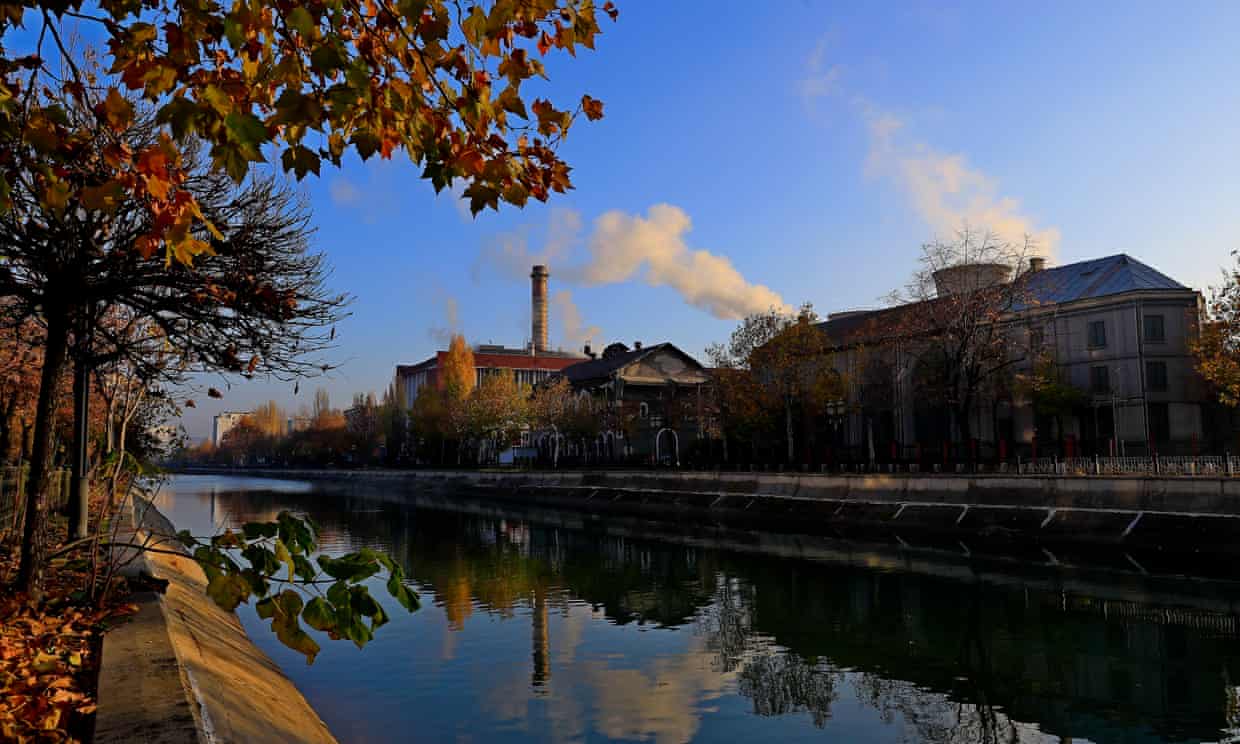
Greenhouse gas emissions rose at ‘alarming’ rate last year, US data shows
Carbon dioxide levels rose by more than two parts per million (ppm) for the 11th consecutive year: the highest sustained rate of CO₂ increases since monitoring began 65 years ago. Before…
-
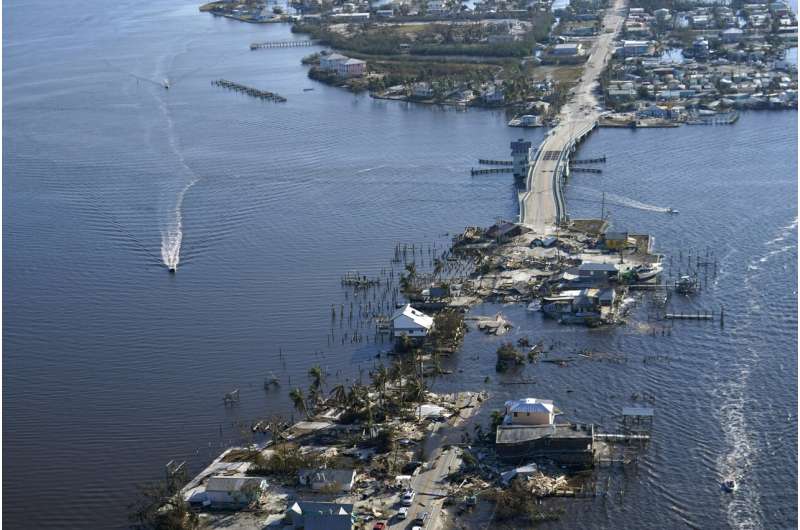
“Buckle up. More extreme events are expected,” says head of the US National Oceanic and Atmospheric Administration
The United States is Earth’s punching bag for nasty weather. Blame geography for the U.S. getting hit by stronger, costlier, more varied and frequent extreme weather than anywhere on the…
-
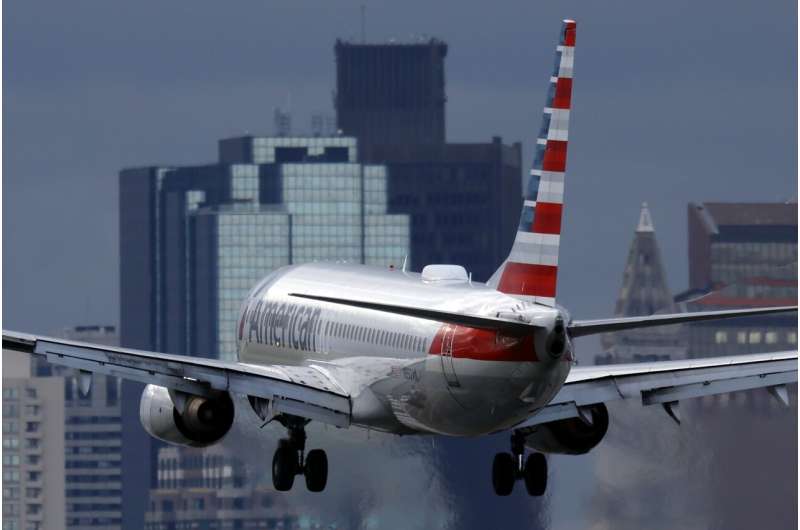
Carbon dioxide emissions reached a record high in 2022
Communities around the world emitted more carbon dioxide in 2022 than in any other year on records dating to 1900, a result of air travel rebounding from the pandemic and…
-

Faster, higher, hotter: What we learned about the climate system in 2022: Part 3
Risks are cascading and underestimated, new climate extremes recorded, and the conclusion.
-

Faster, higher, hotter: What we learned about the climate system in 2022: Part 2
2°C degrees is not a point of system stability, we are heading towards 3°C or more, and system-level change and tipping points are happening faster than forecast.
-

Faster, higher, hotter: What we learned about the climate system in 2022: Part 1
Record emissions, the 1.5°C target, what about overshooting 1.5°C and cooling back to that level by 2100?, and the likelihood of achieving the 2°C target.
-
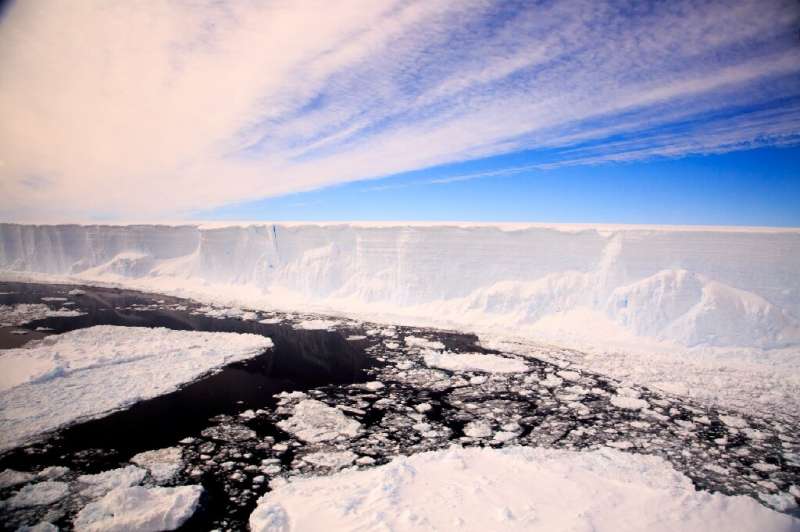
Climate, ice sheets & sea level: the news is not good
Parts of Earth’s ice sheets that could lift global oceans by meters will likely crumble with another half degree Celsius of warming, and are fragile in ways not previously understood,…
-

Worst impacts of sea level rise will hit earlier than expected, says modeling study
Using the new measurements of land elevation, Vernimmen and co-author Aljosja Hooijer found coastal areas lie much lower than older radar data had suggested. Analyses of the new lidar-based elevation…
-

Energy and Climate Data Summary
A summary of the latest energy and climate data has been published on this site. Image above is Bełchatów Power Station, Poland.
-
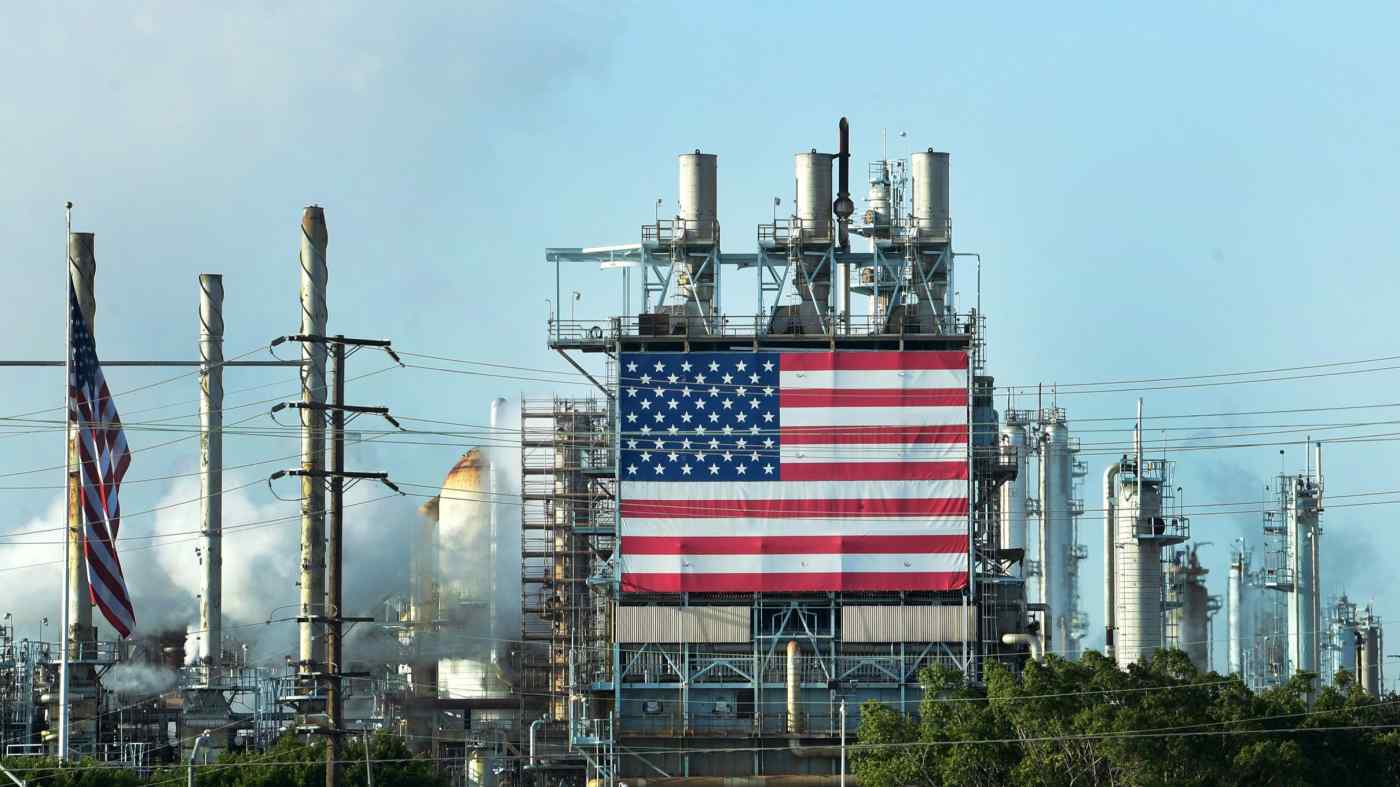
Exxon and Chevron share $100bn in profit after surge in oil prices
Exxon was expected to record more than $56bn in profits in 2022 and Chevron is set to top $37bn, record highs for both companies, according to Wall Street estimates compiled…
-
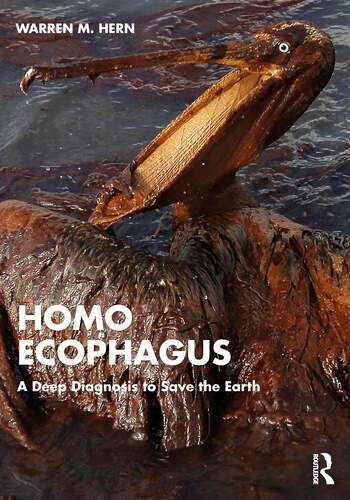
Humanity devouring itself and the planet
“At the moment,” writes Warren Hern, “we are the most misnamed species on the planet: Homo sapiens sapiens—’wise, wise man.’ Not.” Hern, 84, physician and adjunct professor of anthropology at…
-
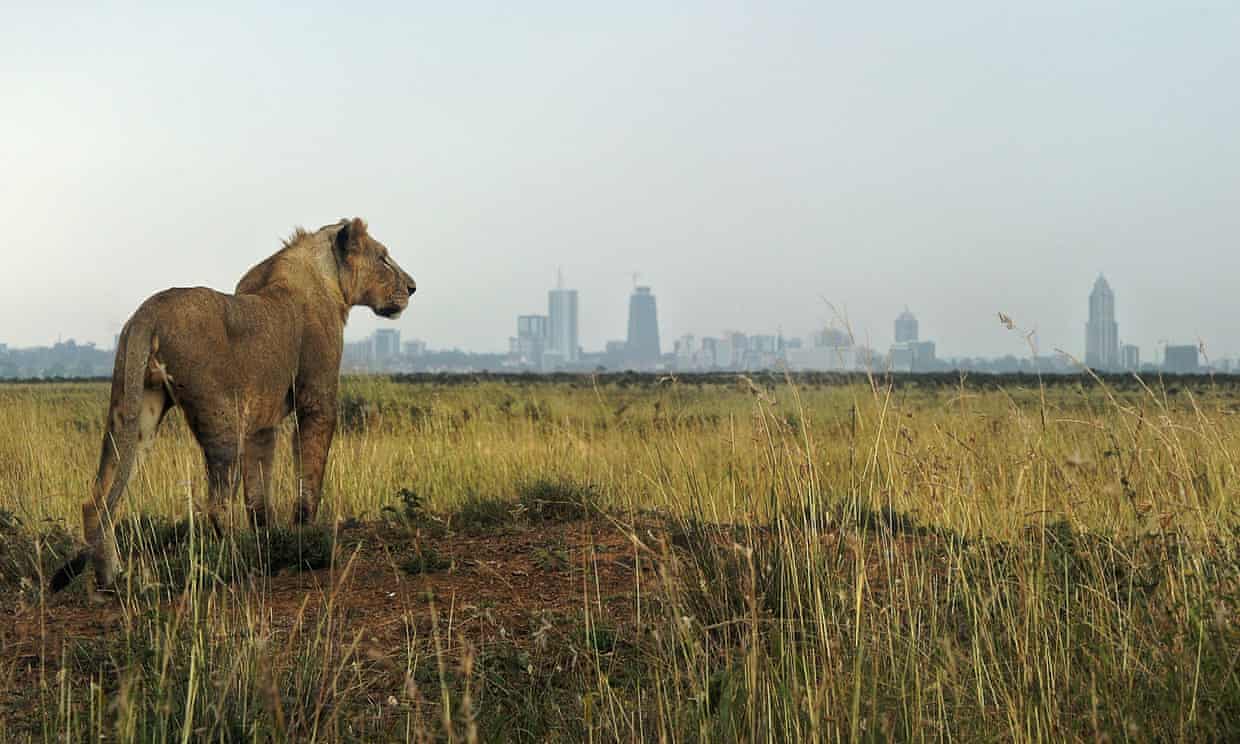
Almost 70% of animal populations wiped out since 1970, report reveals
Earth’s wildlife populations have plunged by an average of 69% in just under 50 years, according to a leading scientific assessment, as humans continue to clear forests, consume beyond the…
-
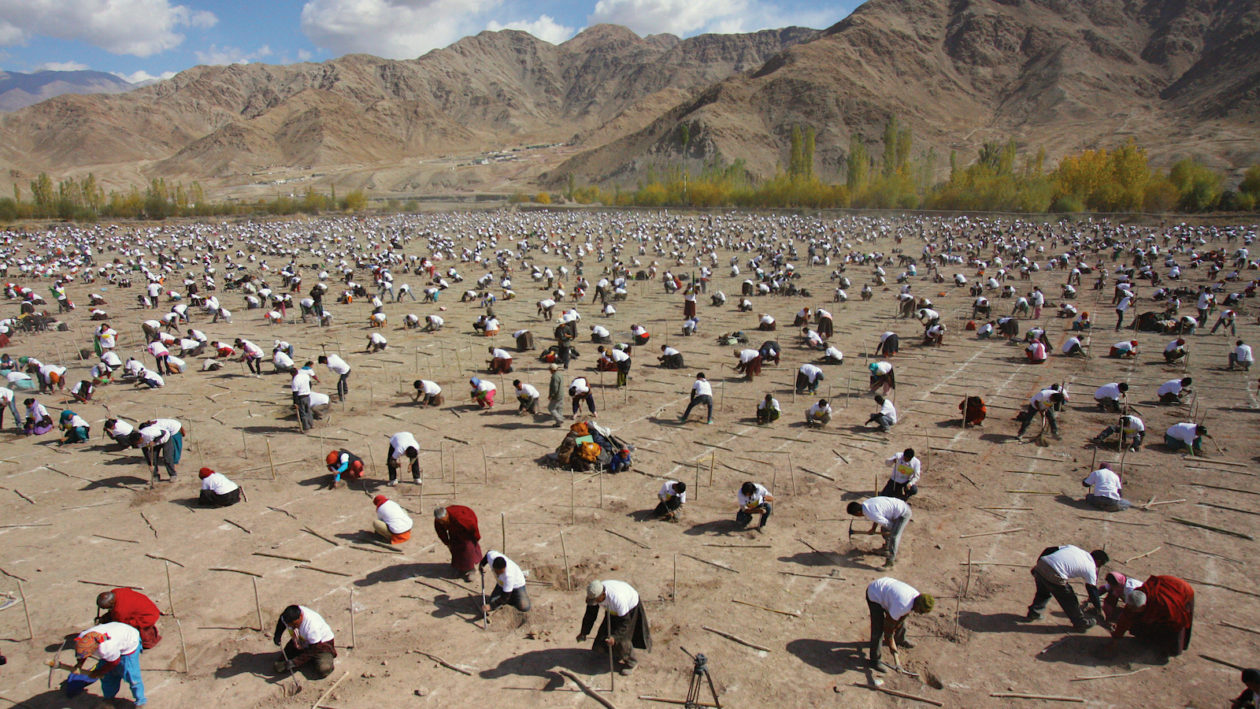
Phantom Forests: Why Ambitious Tree Planting Projects Are Failing
Everybody likes trees. There is no anti-tree lobby. A global push to go beyond conservation of existing forests and start creating new ones goes back to 2011, when many of…
-
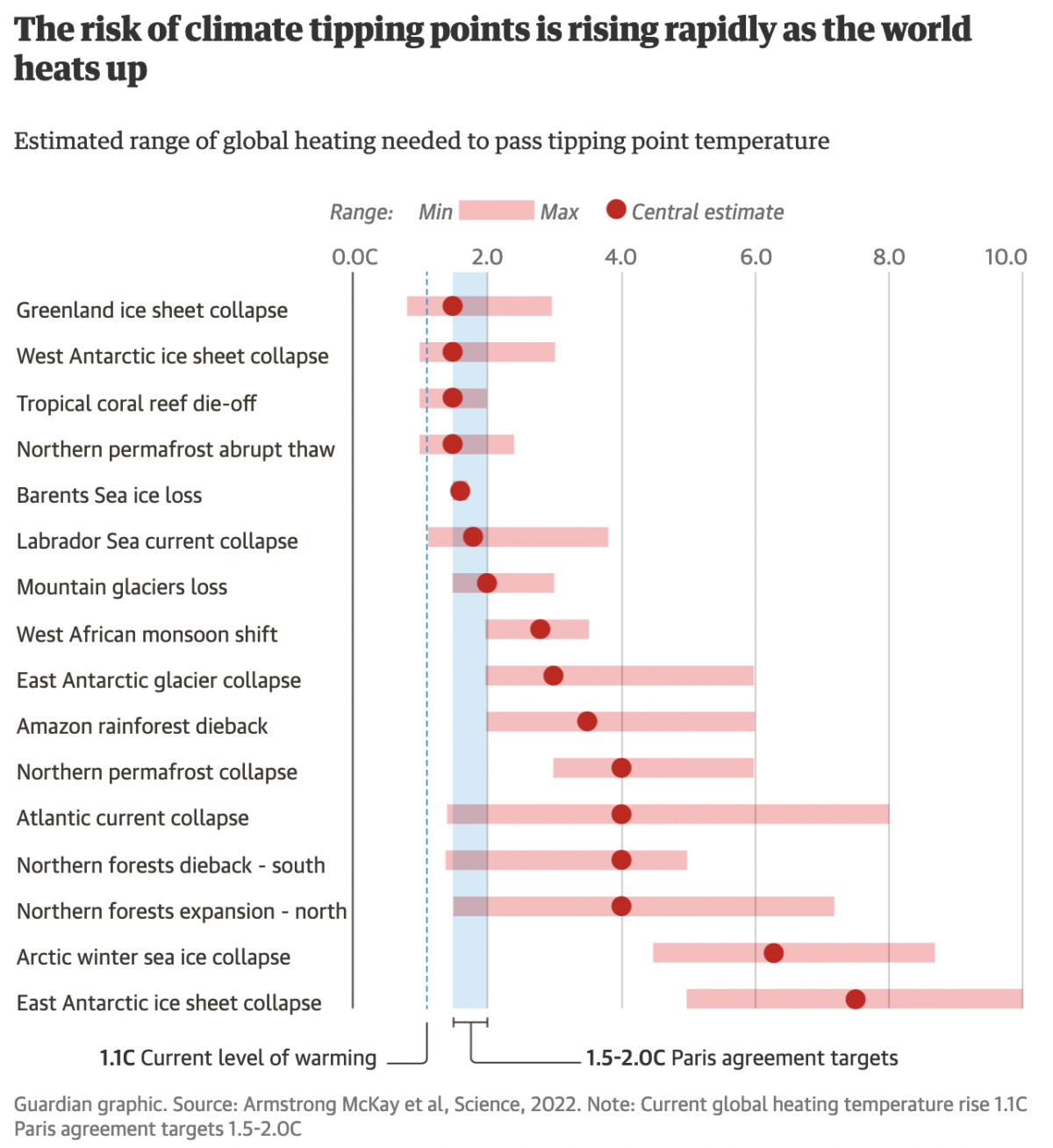
World on brink of five ‘disastrous’ climate tipping points
The climate crisis has driven the world to the brink of multiple “disastrous” tipping points, according to a major study. It shows five dangerous tipping points may already have been…
-
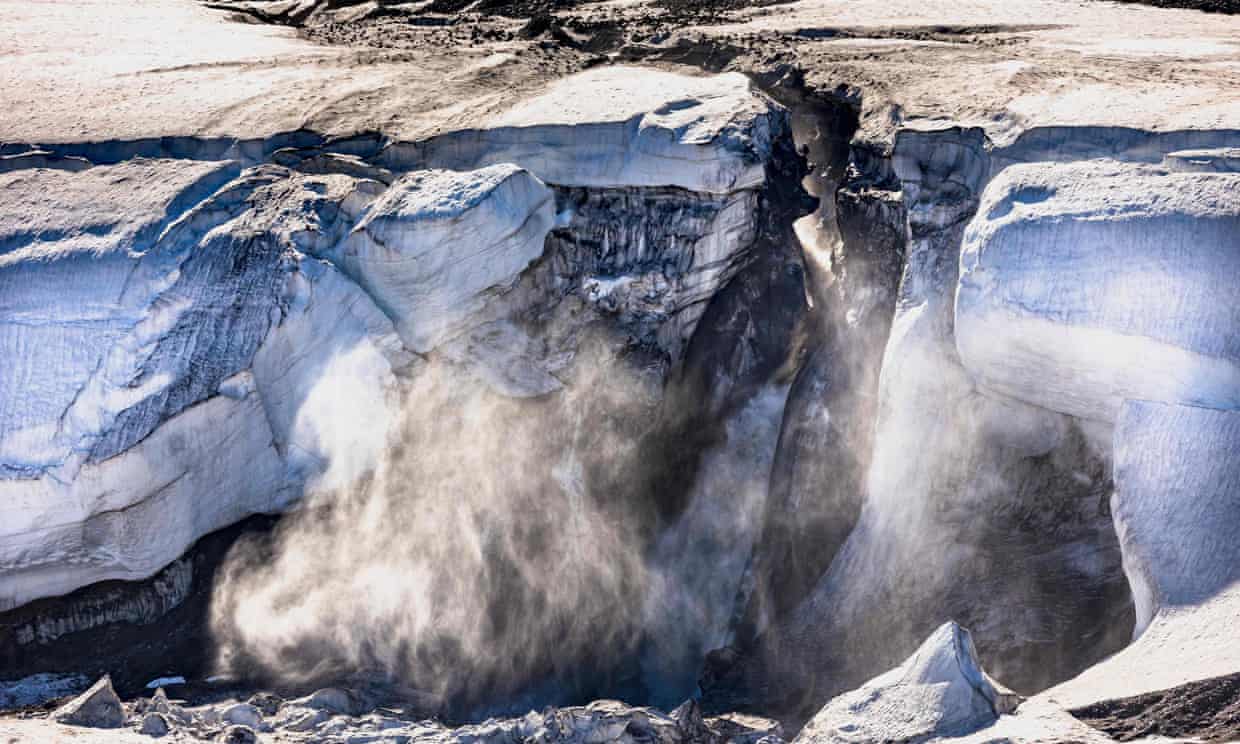
Major sea-level rise is ‘now inevitable’
Major sea-level rise from the melting of the Greenland ice cap is now inevitable, scientists have found, even if the fossil fuel burning that is driving the climate crisis were…
-
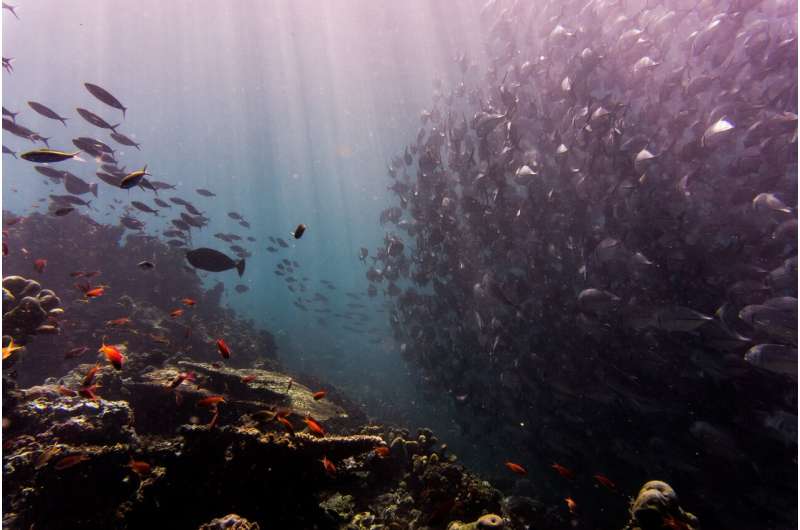
90% of marine species at risk of extinction by 2100 if greenhouse gas emissions are not curbed
An international team of researchers looked specifically at 25,000 species, including fish, bacteria, plants and protozoans living in the top 100 meters of the world’s oceans. They found that under…
-

Corinne Le Quéré: ‘Could we just adapt to climate change? The answer is no’
In the 2000s, Le Quéré was a lead author of the reports of the Intergovernmental Panel on Climate Change, which won a Nobel Peace Prize. Today she bridges science and…
-
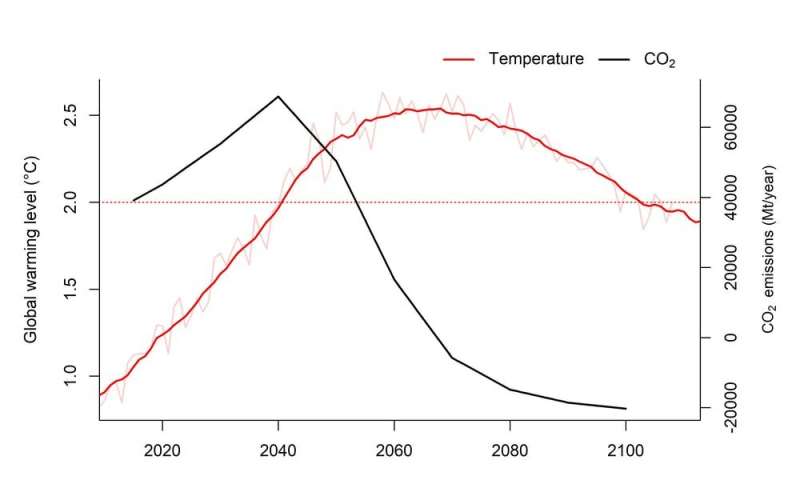
Even temporarily overshooting 2°C would cause permanent damage to Earth’s species
Unless urgent action is taken, emissions are expected to cause the planet to continue heating rapidly over the next few decades, prompting the global average temperature to overshoot the Paris…
-
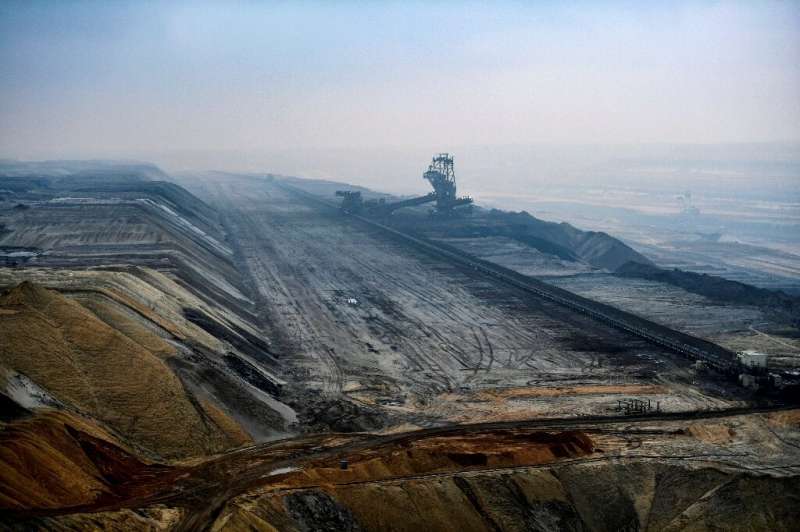
Boom and Bust Coal 2022
The world has more than 2,400 coal-fired power plants, for a total capacity of nearly 2,100 gigawatts (GW). An additional 176GW of coal capacity is under construction at more than…
-
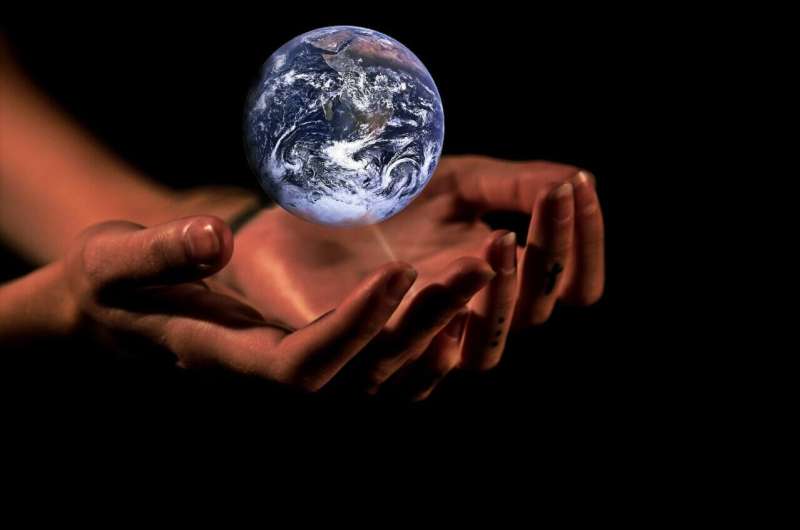
The great climate backslide: How governments are regressing worldwide
From the U.S. to China, in Europe, India and Japan, fossil fuels are staging a comeback, clean energy stocks are taking a hammering, and the prospects for speeding the transition…
-
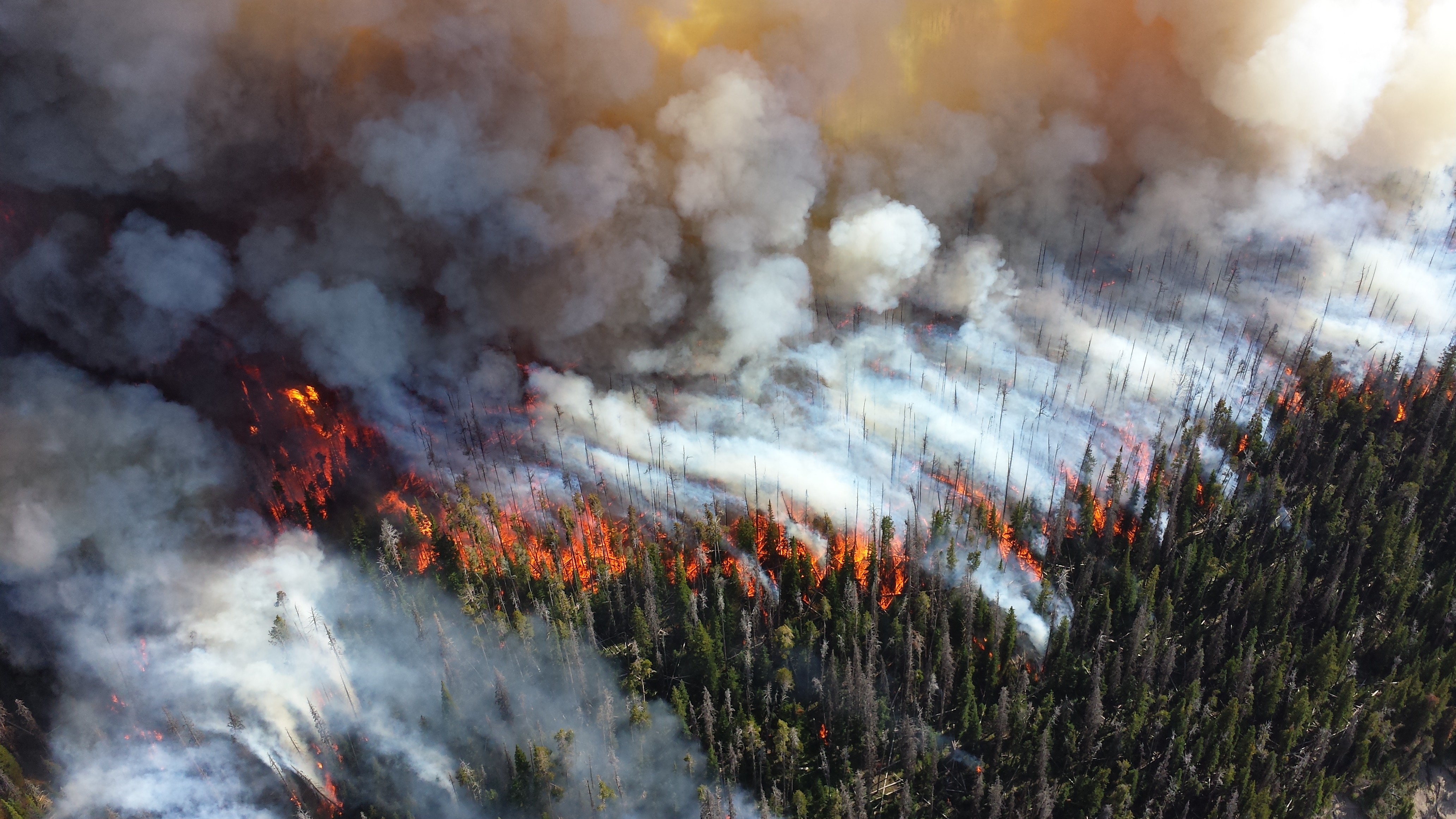
UK government: 4°C warming by 2100: “can’t be ruled out”
As required by the UK Climate Change Act 2008, the government has today submitted the Third Climate Change Risk Assessment (CCRA3) to Parliament. Professor Richard Betts MBE, who led this…
-

The Extinction Crisis
Earth now faces a global extinction crisis never witnessed by humankind. Scientists predict that more than 1 million species are on track for extinction in the coming decades. Every taxon…
-
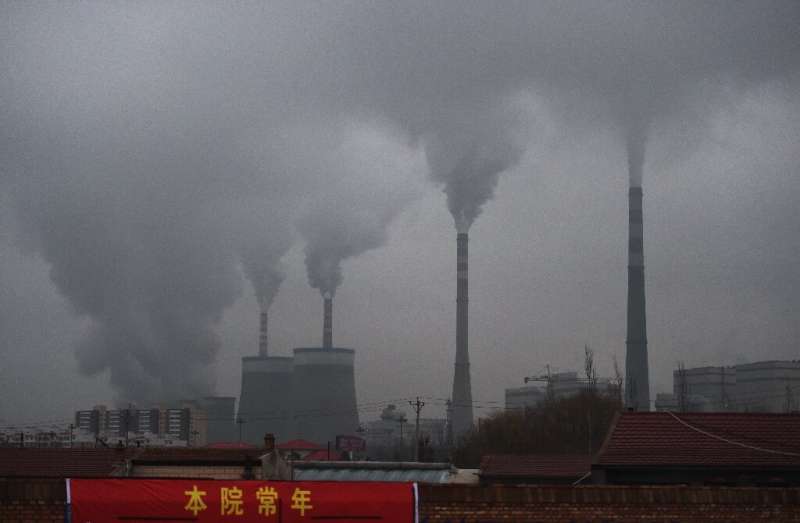
Covid recovery to drive all-time emissions high: IEA
Carbon emissions are set to hit an all-time high by 2023 as just two percent of pandemic recovery finance is being spent on clean energy. “Not only is clean energy investment…
- Crutzen PJ, Stoermer EF. The ‘Anthropocene’. IGBP Newsletter. 2000 May; 41:17-18, http://www.igbp.net/download/18.316f18321323470177580001401/1376383088452/NL41.pdf.[↩]
- Zalasiewicz, J., Williams, M., Haywood, A., & Ellis, M. (2011). The Anthropocene: a new epoch of geological time?. Philosophical Transactions of the Royal Society A: Mathematical, Physical and Engineering Sciences, 369(1938), 835-841, https://royalsocietypublishing.org/doi/10.1098/rsta.2010.0339.[↩]
- Gaffney, O., & Steffen, W. (2017). The anthropocene equation. The Anthropocene Review, 4(1), 53-61, https://journals.sagepub.com/doi/pdf/10.1177/2053019616688022[↩]
- Steffen, W., Rockström, J., Richardson, K., Lenton, T.M., Folke, C., Liverman, D., Summerhayes, C.P., Barnosky, A.D., Cornell, S.E., Crucifix, M. and Donges, J.F., 2018. Trajectories of the Earth System in the Anthropocene. Proceedings of the National Academy of Sciences, 115(33), pp.8252-8259, https://core.ac.uk/download/pdf/160477113.pdf[↩]
